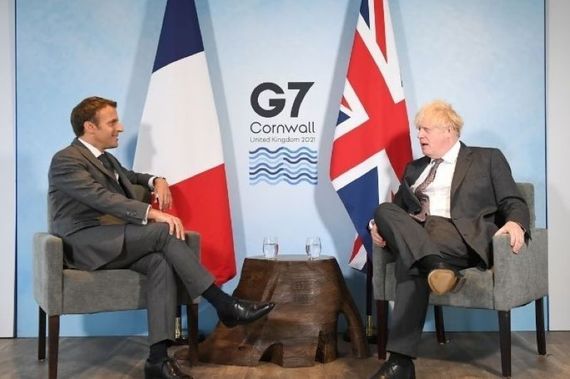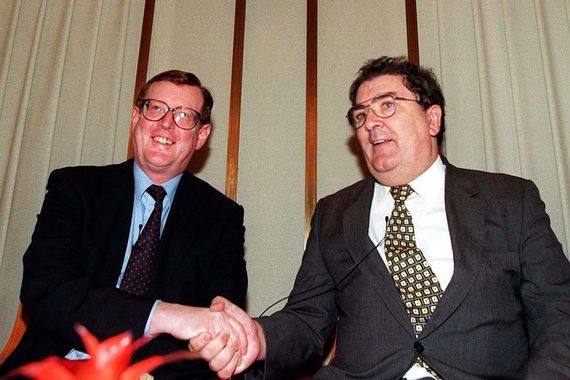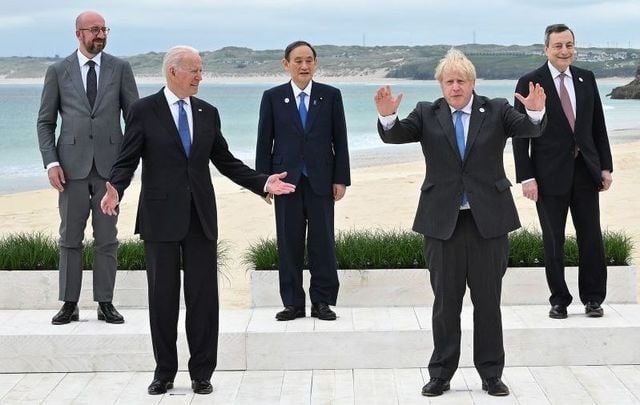Everyone's in agreement the Northern Ireland Protocol must be implemented but nothing will change unless the Unionists are on board.
For a while last week at the G7 meeting in Cornwall, it sounded like Northern Ireland had become the center of the world.
The most important issue facing the G7 leaders and the west did not appear to be climate change or the threat to democracy from China and Russia or getting the digital giants to pay tax, or agreeing on how to vaccinate the rest of the world to finally beat Covid.
No, judging by the headlines and the TV clips, the main issue facing mankind appeared to be the Northern Ireland Protocol. All the G7 leaders had something to say about it. Biden, Macron, Merkel, they were all at it.
And, apart from U.K. Prime Minister Boris Johnson, they were all in agreement. The Protocol has to be implemented in full because there is no alternative.
Other leaders at the meeting in Cornwall chimed in, including the president of the EU Commission, Ursula von der Leyen. The fact that most of them have rarely, if ever, visited the North and are far from being experts on its problems did not stop them.
Nothing must be allowed to jeopardize peace on the island of Ireland, they said. There has to be a border in the Irish Sea because there cannot be a land border. Johnson signed up to this in the Protocol. Now he has to live with it.
Behind these admonitions, there was a good deal of virtue signaling going on. No one wants to see the return of The Troubles in Ireland, and endlessly repeating this makes everyone feel virtuous.
And this was one thing they could all agree on -- apart from a few pious aspirations, they were unable to agree on much else.
Some of them have their own reasons for taking a hard line on the Protocol. Biden plays to his Irish American roots. Macron and Merkel want revenge for Brexit. Von der Leyen hates Johnson for making her and the EU look incompetent on the vaccine rollout. So they won't give him an inch.

President Emmanuel Macron and President Joe Biden at the G7, in Cornwall.
The difficulty with this blanket refusal is that it is too simplistic. It is playing a dangerous game since it ignores the views of unionists, not just the Democratic Unionist Party crackpots but the wider unionist community as well.
The Twelfth of July is just weeks away and this year there is the potential for real trouble because of the fury over the Protocol. Against this background, taking an inflexible line and lecturing Johnson and the unionists is not sensible. It won't get us anywhere.
Much has been said about not doing anything that could damage the Good Friday Agreement. Failure to implement the Protocol and the border in the Irish Sea would do just that, it is argued because it could lead to some version of a land border in Ireland.
But let's remember that the unionist leader who (together with John Hume) won the Nobel Peace Prize for negotiating the Good Friday Agreement over 20 years ago was David Trimble. And Trimble is adamantly opposed to the Protocol.

David Trimble and John Hume. (RollingNews.ie)
The fact is that there is wide opposition among unionists, and pretending this does not exist is not going to solve the problem. It goes far beyond the latest issue thrown up by the Protocol, the so-called sausage war.
One of the postponed checks on goods coming from Britain into Northern Ireland is on chilled meats, including minced meat and sausages. Those checks are due to start at the end of the month and it has caused widespread derision and anger in the North since it threatens the Ulster fry, the North's favorite breakfast.
Sausages have been imported into the North from the U.K. for decades, unionists say. The sausages have not changed so why is it suddenly a problem? It's just the EU being bloody-minded and Johnson is right to say he won't implement the checks.
Johnson himself challenged Macron on this on the bad-tempered final day of the G7 summit. How would Macron feel if there had to be checks on the famous Saucisse de Toulouse (Toulouse sausages) before they could be allowed into Paris?
The EU leaders need to be reminded that the U.K. (including the North) is one country, Johnson said, and an internal border with checks inside the U.K. is just not acceptable.
This kind of stuff from Johnson provokes near apoplexy among the EU leaders. He signed up for it, they cry. And they are right, he did.
But it's also worth remembering that just three years ago, before he became prime minister, Johnson visited the North and told unionists that Northern Ireland could not be left behind as "an economic semi-colony of the EU” with "regulatory and even customs controls" between Britain and the North. No British government could sign up to that, he said at the time.

The Northern Ireland border with the Republic.
Yet that is precisely what he did as prime minister to get Brexit over the line. What now seems clear, however, is that his view had not changed. He had no intention of implementing a border in the Irish Sea in anything more than a very cursory way.
You can see this as duplicitous. Or you can see this as Johnson just doing what Johnson does, saying whatever he thinks will get him what he wants.
To be fair to him, he is grappling with an impossible problem. After Brexit, there has to be a border somewhere. Since Northern Ireland (like the rest of the U.K.) is out of the EU and Ireland is still in, a border is needed to protect the EU Single Market and Customs Union.
The general consensus was that it could not be a land border because of the danger of restarting violence. So the answer was putting it in the Irish Sea.
Under the Protocol, Northern Ireland left the EU with the rest of the U.K. but it continues to apply Customs Union and Single Market rules. In effect, it is still in the EU from an economic point of view.
This has meant there is no need for a land border in Ireland despite the danger of seepage of goods from the U.K. into the south. Instead, there is a border in the Irish Sea to check on goods coming into the North from the U.K. to ensure they meet EU standards and customs rules.
This did not cause any difficulty in the North when the deal was done at the end of 2019 because the transition year that followed meant that nothing really changed and business carried on as usual. But that is now over and the new Protocol arrangements have begun to bite.
It's not just about sausages or the other popular items that have been affected and made the headlines. It's not even about the general disruption and delays caused to trade between the U.K. and the North which will get much worse when the Protocol is fully implemented.
The unionists have a problem with the very concept of the Protocol. They see it as an unacceptable interference by the EU which is separating the North from the U.K.
You can say they are being over-sensitive. But for them, this is a visceral matter that goes to the core of their identity.
And the situation is not helped by Biden saying that Johnson is "inflaming" the situation and that there can be no deviation from the full implementation of the Protocol. Nor is it helped by Taoiseach Micheál Martin saying that Biden's intervention was "a significant development."
Instead of rolling their eyes at the antediluvian views of the DUP and ignoring the rest of the unionists, the EU needs to soften its stance. It's not just a question of "working through" any difficulties the Protocol throws up, as the Minister for Foreign Affairs Simon Coveney is fond of saying. These problems cannot be wished away.
A fundamental review of the Protocol is needed. It may need to be replaced altogether by a far less intrusive system, perhaps a combination of much lighter checking at ports in the North and random, invisible, technical checks at the land border on goods coming south. It's not our preferred solution but it would be better than endlessly parroting the current hard-line that there is no alternative.
It comes down to whether we really want to get the unionists on board. Strolling along the seafront in Cornwall was never going to do it.
*This column first appeared in the June 16 edition of the weekly Irish Voice newspaper, sister publication to IrishCentral.




Comments